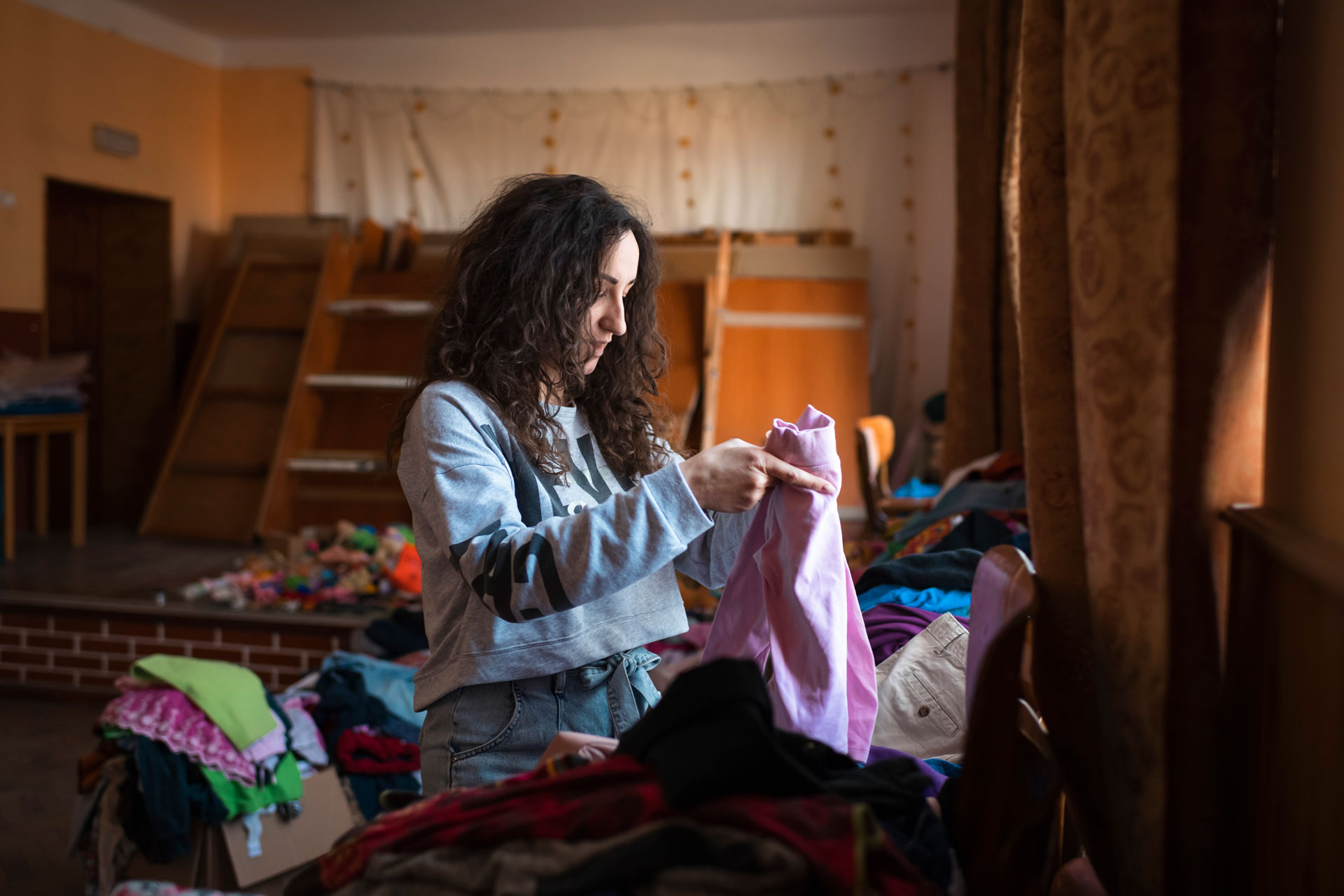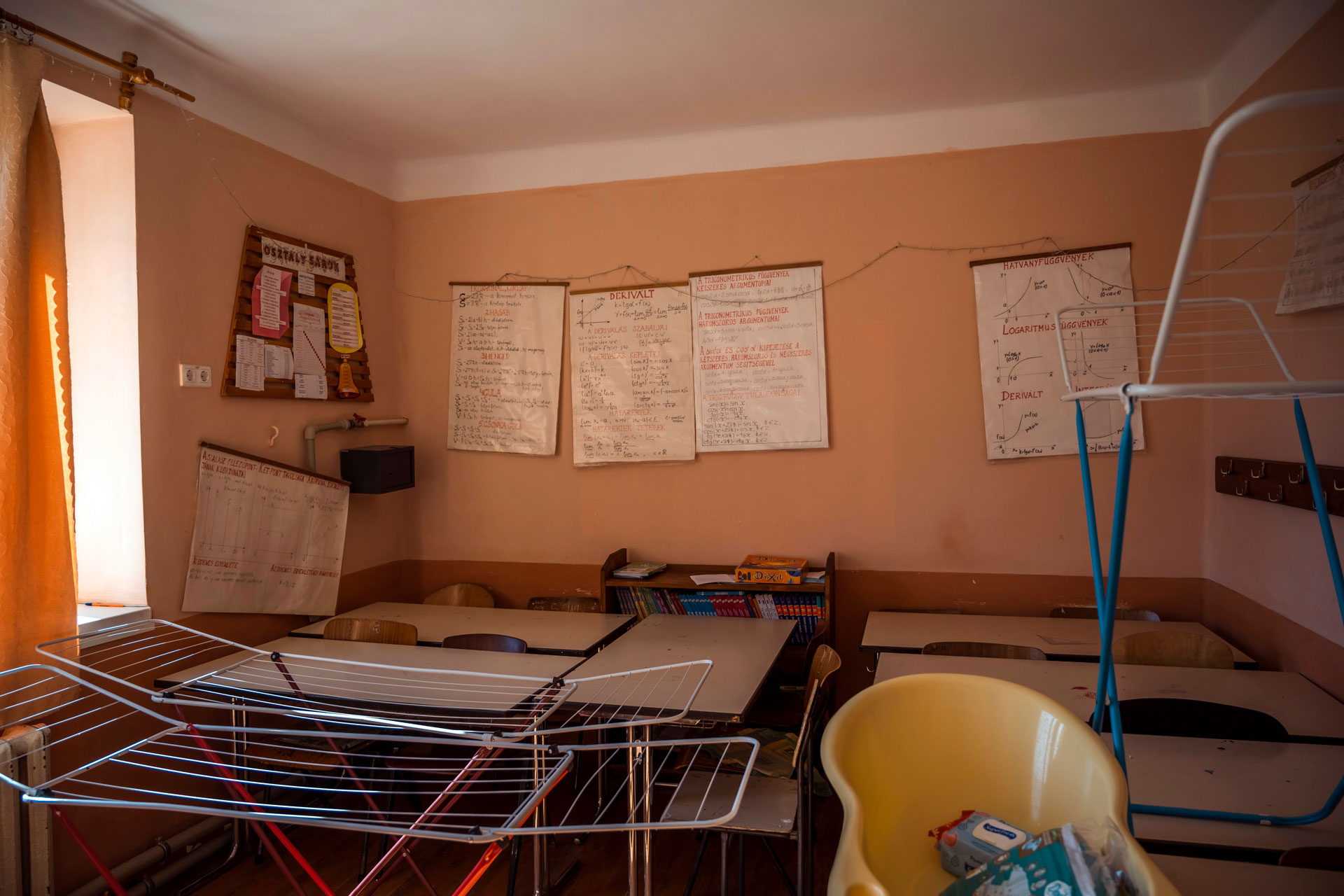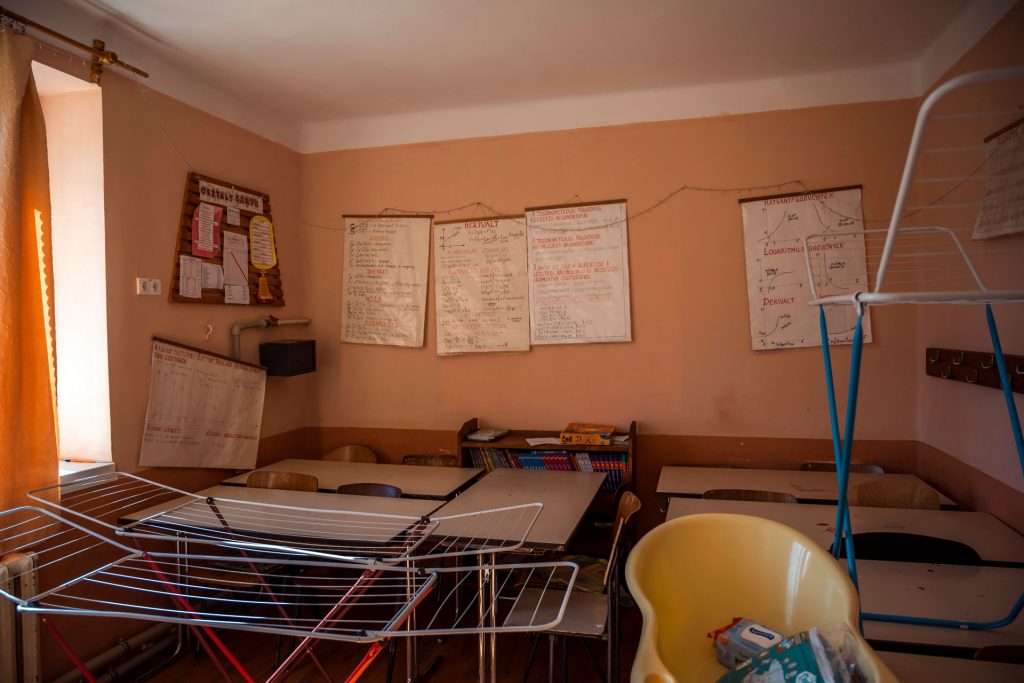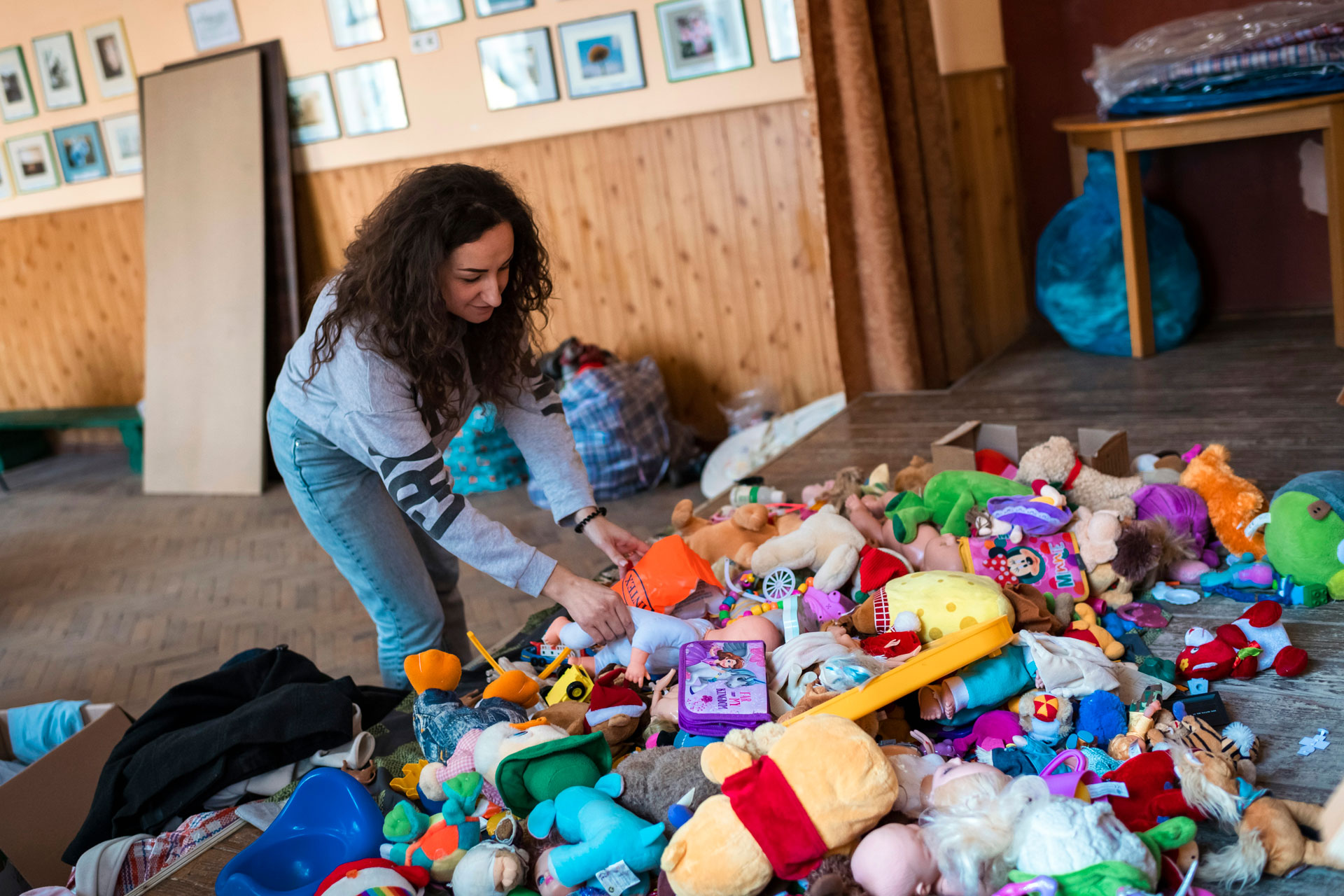“Most mothers are here alone with their children” — Ukrainian teacher Erika Pavliuk already misses her blackboard, but first she helps refugees staying at the school
When Russia attacked Ukraine, English teacher Erika Pavliuk sent her students home and started volunteering at the refugee shelter set up at the school. Pavliuk helps internally displaced people who’ve fled other parts of Ukraine by offering a bed, warmth, and food.
“I HEARD the news from my husband. He was surfing on the internet and said the words that will always play in my head: our country has been attacked.”
English teacher Erika Pavliuk sits in her empty classroom in Berehove in eastern Ukraine, near the border with Hungary, and runs over the events of an early Thursday morning. It was 24 February 2022, and Russia had begun a brutal war of aggression against Ukraine.
Pavliuk says that she, in disbelief, dismissed the news at first. The family members continued with morning routines in uncertainty. Their 5-year-old daughter was taken to daycare, and unaware of what was really happening, Pavliuk headed to her workplace in the local school.
In the first class of the day, the teacher was standing in front of her 12-year-old pupils in the classroom. The atmosphere was dreary.
“I remember a boy sitting in class looking really pale. His nose started to bleed. I told the pupils to put their books aside and decided to just talk about what the children were most worried about. Practically, my pupils were afraid of being killed soon,” Pavliuk recalls.
After the first class on Thursday, the school received instructions from authorities. Teaching had to be suspended and all pupils were to be sent home.
“The daycare of my daughter also rang me to say that she must be picked up immediately. As soon as I arrived, the children had already been evacuated from the building. They were waiting for their parents outside, and at that moment nobody knew what would happen next.”

A few of weeks later, we already know a little more about what would happen in the coming months. In March, Russia would carry out missile strikes against the most strategically important targets in western Ukraine as well, but the most destructive battles would take place elsewhere in the country.
In early April, already four million Ukrainian refugees would have crossed the border to neighbouring countries. On top of this, western Ukraine would receive an immense number of internally displaced people.
From a teacher to a volunteer
As the war went on, Pavliuk, her colleagues, and other residents of the small town of Berehove began to understand the situation. Refugees from other parts of Ukraine started to arrive at the school already at the end of February.
In a matter of days, the entire town of Berehove set out to help those fleeing war. The teachers, school cooks, and other members of staff started volunteering. Pavliuk and her colleagues went through donations, organised things on behalf of refugees arriving at the centre, and helped them with whatever issues they might face.
The days were long for everyone, and there was no time for days off. Pavliuk says that time went by fast.
“The energy just came from somewhere. People needed help. I didn’t feel tired during the day, but when I went home, I fell asleep immediately when my head hit the pillow.”


The school soon became an important hub, as it was possible to prepare food for large crowds in its big kitchen. In normal times, 300 pupils go to the school.
“During the first days, some refugees only stayed at the shelter for a few hours, took a shower, and ate something. After that, they continued towards the border. We didn’t know what direction the situation would take,” Pavliuk says.
The school can accommodate approximately 80 refugees in bunk beds in the rooms previously used by school students. As the fighting dragged on, some of the refugees stayed at the shelter for weeks. Hungarian Interchurch Aid, a partner organisation of Finn Church Aid, provided the kitchen with new refrigeration equipment, numerous food deliveries, and a washing machine for the utility room.
Fathers stay on the front line
As a volunteer, Pavliuk has heard stories from various families fleeing fighting, and she feels moved recalling them. Many of those who’ve stayed at the shelter for longer don’t intend to cross the border to Hungary unless they absolutely have to. Many plan on returning home or at least as close to it as possible. Pavliuk understands them.
“Every morning I wake up feeling thankful for having had a peaceful night here (in western Ukraine). I have grown up here, I was born here, my parents and many generations before them have lived here. I can’t even begin to imagine leaving my home and my town just because some aggressor forces me to do so.”
Pavliuk deems witnessing the everyday life of mothers and children at the shelter particularly difficult.
“Most of the mothers are here alone with their children. Normally they live closely together with their husbands, and now the men are in the army. My heart hurts just thinking about them having to look after their children in a place they don’t really know. There are eight people living in each room, and they don’t know these people, even if now they’re slowly getting to know each other.”

Pavliuk sees a silver lining in the crisis: she says that the war and the consequential refugee crisis have made people work together in unprecedented ways. Just like Pavliuk, many people living in the border town of Berehove are citizens of two countries and cultures, and cohabitation hasn’t always been easy.
“I’m Hungarian by nationality, but I’ve lived on the Ukrainian side all my life, so I’m also Ukrainian. There have been disagreements between Hungarians and Ukrainians as well as other minorities in this area. I feel like things are no longer like that.”
Remote teaching started after pausing for weeks
Pavliuk says that before the war, people in her school were already looking forward to returning to business as usual after a long pandemic. Due to the war, the state of emergency in the school has continued. Already knowing how to teach and study remotely came in handy in late March, when the pupils in Berehove returned to remote teaching after a three-week break.
The children at the refugee shelter have been able to sign up for classes in Ukrainian schools in the town or continue studying with their own classes if their schools have been able to provide teaching. The children log in on classes in the computer classroom at the shelter.
Pavliuk’s Hungarian-speaking pupils stayed at home, as their school was still full of refugees. During the day, Pavliuk works at the shelter, and in the evenings, she prepares her English classes for the following day. She seems moved when she talks about her 12 to 18-year-old students.
“They’re teenagers. We have our ups and downs, but we can always find a solution to our difficulties. I love them.”
She already knows that some pupils have fled from Ukraine to Hungary and they won’t be coming back to her classes. Pavliuk takes a deep breath and looks around in her own empty classroom. What is her biggest wish?
“To be able to teach normal classes. I want to write on that blackboard and…,” she hesitates for a moment and starts laughing tiredly, “…yell at my students for not having done their homework.”
Text: Ulriikka Myöhänen
Photos: Antti Yrjönen